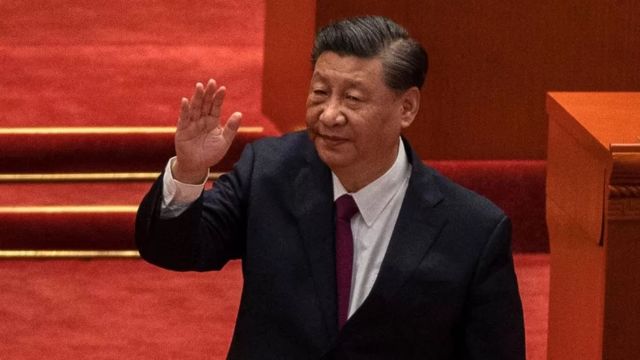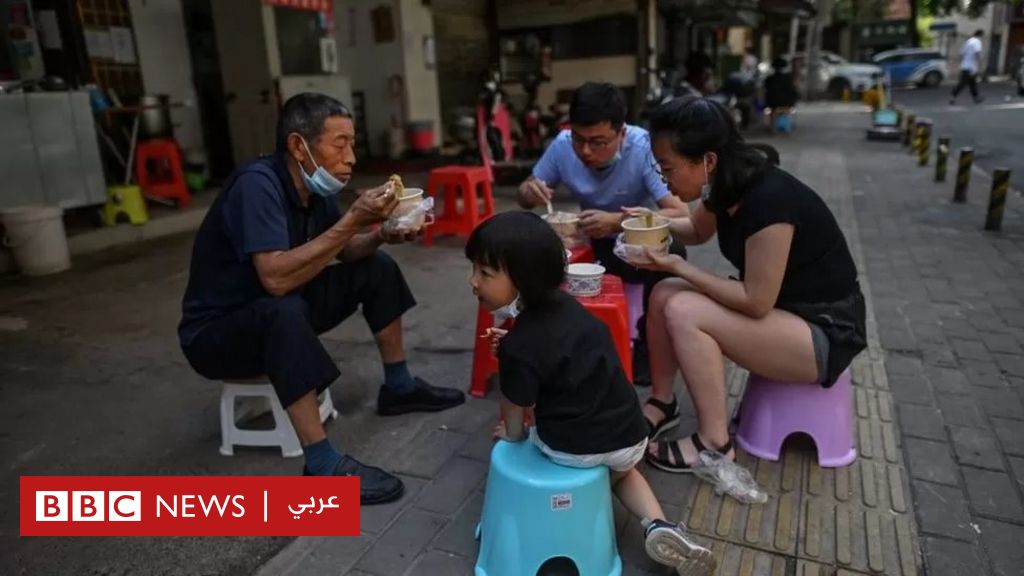- Surangana Tiwari and Peter Hoskins
- BBC
October 5, 2022
photo released, Getty Images
COVID-19 has severely damaged the second largest economy in the world
The Chinese economy is witnessing a slowdown in the recent period, conditioned by the country’s adoption of the “zero Covid” strategy and by the severe lack of demand.
Chinese growth data is expected to appear soon in the third quarter of 2022, and if the world’s second largest economy shrinks, that increases the chances of a global recession.
Beijing’s 5.5% growth target appears to be out of reach despite Chinese officials downplaying the country’s need to achieve this, while China narrowly avoided deflation in the second quarter of this year. But this year, a number of economists are not expecting China’s growth at all.
China may not have entered the war with hyperinflation like the US and UK, but it has other problems: The world factory was recently surprised that there aren’t enough consumers to buy what it produces both domestically. than international.
Among the problems afflicting the Chinese economy also loom trade tensions with other large economies such as the United States, which are also hindering the progress of the economy.
The yuan is also on track for its worst performance against the US dollar in decades. The undervalued currency is known to scare investors, which creates uncertainty in the money markets. The weak currency also makes it difficult for the central bank to inject money into the markets.
And all of this is happening amid the growing stakes of Chinese President Xi Jinping, who is expected to get an unprecedented third term as president of the Chinese Communist Party, starting October 16 this year.
The following is a review of the most important events in China in the recent period and its impact on the second largest economy in the world.
1. Zero Covid devastation
The spread of Covid-19 has been in many Chinese cities, including cities that are manufacturing centers of major industries such as Shenzhen and Tianjin, which has caused severe damage to economic activity in most sectors.
Spending on food and beverages, retail products and tourism also decreased, putting major services under more pressure.
But at the manufacturing sector level, factory activity returned to improving last September, according to the National Bureau of Statistics.
This rebound could be the result of higher public spending on infrastructure in the country in the recent period. Furthermore, this progress is the first made by the sector after two months of stagnation, which raises several questions, especially since the results of a special opinion poll indicated that the activity of Chinese factories decreased last September due to the negative impact of falling demand on manufacturing production and new orders, employment.
Demand has declined in countries such as the United States due to high interest rates, high inflation and the fallout from the war in Ukraine. Experts believe Beijing can stimulate the economy, but believe there is no logical reason to do so until the “zero Covid” strategy is in place.
“There isn’t enough justification for investing money in the economy if companies can’t expand and people can’t spend,” said Louis Kuijs, Standard & Poor’s chief Asian economist.
2. Beijing is not doing enough
China announced a trillion yuan ($ 203 billion) plan to support small businesses, infrastructure and real estate last August.
But the country’s officials can do more to increase spending with the goal of achieving growth and creating more jobs.
These efforts include greater investment in infrastructure, easier lending terms and tax breaks for Chinese families.
According to Kuijs, the government’s response to the weakness of the economy has been modest compared to what Beijing did in previous periods of weakness in the country’s economy.

photo released, Getty Images
The Chinese president pushes for the “zero COVID” strategy.
3. The real estate market is in crisis
There is no doubt that the weakness of the real estate market and the negative sentiment that dominates the real estate sector is one of the most important factors contributing greatly to the slowdown in the Chinese economy.
The downturn in this sector was one of the biggest blows to the economy as the real estate sector and its closely related sector account for around a third of China’s GDP.
“When confidence in the housing market wanes, it leads to uncertainty that takes hold of people about the overall economic situation,” Kuijs said.
There is a reluctance to obtain mortgages for the purchase of unfinished houses or buildings because some suspect their jobs will never be completed. The demand for new homes has also decreased, which has led to a decline in imports of building materials.
Despite Beijing’s efforts to bolster the housing market, house prices in dozens of Chinese cities continue to decline by more than 20% this year.
Analysts say that as real estate developers continue to come under pressure, authorities should do more to restore confidence in the real estate market.
4. Climate change makes the situation more difficult
The extreme weather has begun to leave its negative impact on many economic sectors in China. An intense heat wave, followed by a drought, hit southwestern Sichuan province and central Chongqing province last August.
Due to the high demand for air coolers, pressure has begun to increase on power grids, which depend entirely on water for energy production.
Many factories in the region, including iPhone maker Foxconn and Tesla, have been forced to cut working hours or shut down completely.
The National Bureau of Statistics in China confirmed last August that the steel industry sector has seen its profits drop by around 80% in the first seven months of 2022 compared to the same period last year.

photo released, Getty Images
The crisis in the real estate market in China increases the threats to the economy
After that, the Chinese authorities intervened with tens of billions in support of energy companies and farmers.
5. The tech giants in China are losing investors
It seems that the crackdown launched by the Chinese authorities against the country’s tech giants, which lasted two years, has led to nothing in favor of the Chinese economy.
Giant Chinese tech companies, such as Tencent and Alibaba, have announced their losses for the first time in the last period, as they announced a drop in their profits of around 50%, while Alibaba’s net profit fell by around 50%. half.
Tens of thousands of young people have lost their jobs, adding to the employment crisis that the country is already experiencing, with 1 in 5 people in the 16-24 age group unemployed. This is likely to harm China’s productivity and growth in the long run.
Investors are feeling a shift in China: some of China’s most successful private companies have come under greater scrutiny by the government as Jinping strengthens its hold on power.
State-owned enterprises appear to have an edge in the Chinese market, which is prompting investors to withdraw their money from the country.
Japan’s SoftBank, for example, has withdrawn huge amounts of its investments in Chinese retail giant Alibaba, while Berkshire Hathaway, owned by billionaire Warren Buffett, is offering its stake in leading Chinese automaker BYD for sale. Tencent had a divestment of about $ 7 billion this year alone.
The US is also cracking down on Chinese companies listed on US stock indices.
“Some investment decisions have been postponed and foreign companies are looking to expand their production to other countries,” says a report released by Standards & Poor’s rating agency.
It seems the world has gotten used to the fact that China is no longer as open to the world of finance and business as it was in the past, but the Chinese president risks economic success that puts China in a prime position among the countries of the world. world in recent decades.


